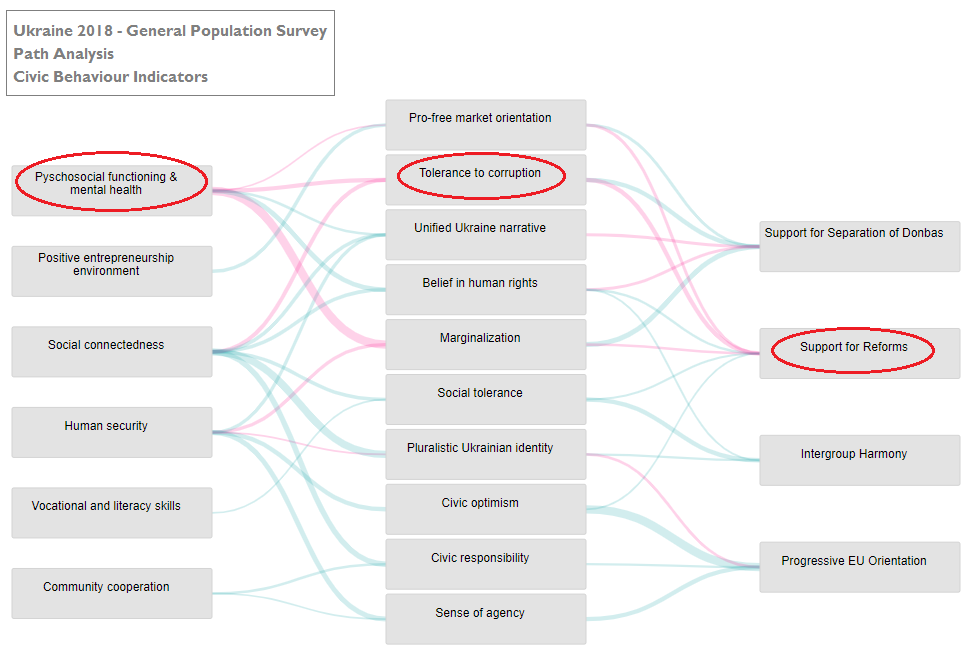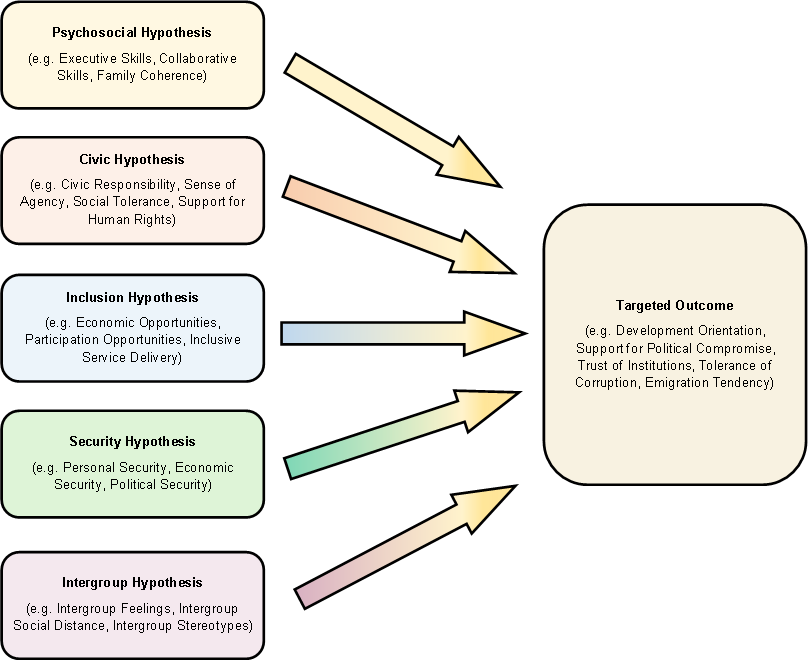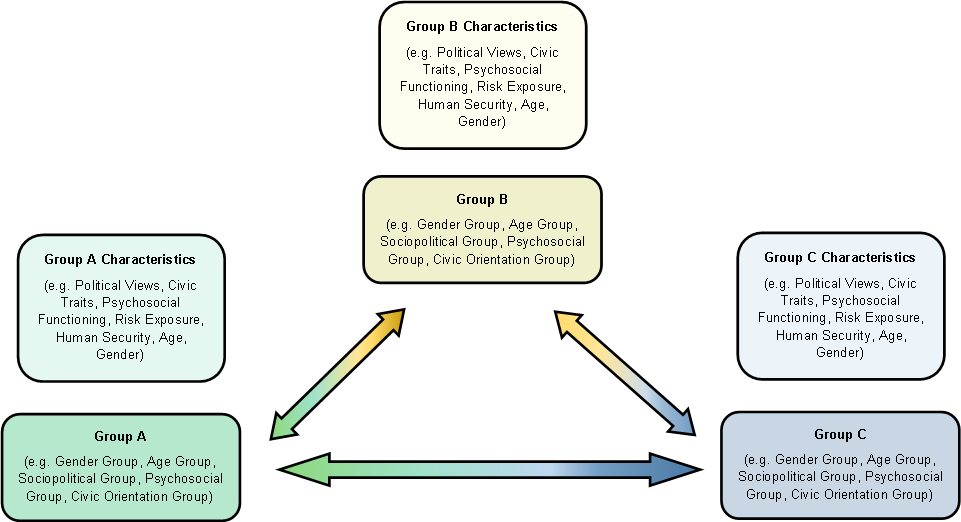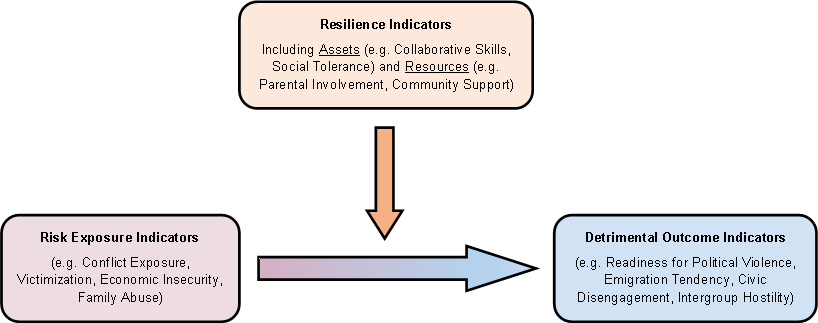Our evidence-based peacebuilding methodology combines an extensive participatory research process with advanced data analysis to identify the drivers of conflict dynamics and peaceful social change. It draws inspiration from multiple scientific disciplines such as sociology, psychology, international relations and security studies and is flexible enough to incorporate new research findings, global policy guidelines and the realities of each local and regional context. The methodology is used to recommend to partners peacebuilding solutions related to social cohesion and reconciliation, youth inclusion, gender empowerment, governance and anti-corruption and urban cohesion. The collection and interpretation of data in these areas allows us to provide policy recommendations to partners, which predict how peacebuilding objectives might be achieved through the implementation of specific policies and projects. Our methodology is underpinned by a Content Framework, which helps us align research objectives with the specific policy outcomes of different partners, and a Process Framework, which ensures local ownership of project results. We invest in ongoing learning and and innovation to improve our methodology so we can provide more incisive and impactful policy and programme advice to governments and international organisations.
Content Framework
The Content Framework focuses on four dimensions of societal functioning which can either contribute to stable, prosperous and resilient societies, or, if they remain unattended, undermine social cohesion and set the country on a course to violent conflict.
Governance and human security refer to the vertical relationship between the citizen and the state. Governance describes how society is managed, usually based on consensus involving private agents, public administrations, and civil society representatives. Human security is defined as the extent to which people feel secure in daily life.
Intergroup relations and identity formation focuseon how people move from individual identities to group identities, and how different group identities contribute to either social cohesion or conflict in any given society.
Psychosocial functioning and community bonding explore how citizens experience their daily lives in relation to themselves, their families and their local communities. It also measures social skills and overall mental health while describing the extent to which citizens feel they can mitigate challenges in daily life and draw support from close social networks.
Civic attitudes and behaviours describes the extent to which citizens take responsibility for issues which concern their communities and national affairs. Active and constructive civic behaviours are important features of a healthy democracy where citizens have the skills and political space to influence decisions which affect their lives.
We have created an extensive library of over 65 peacebuilding indicators which can be used to measure different aspects of these four dimensions in societies seeking to transform conflict. Indicators are used to design a public opinion poll, which is used to solicit the opinions and attitudes of people in the countries in which we work. For example, under the dimension of Governance and Human Security, we may wish to understand and measure the extent to which people feel safe from violence in daily life. To get an understanding of this issue we ask at least 3 questions in a public opinion poll to assess different aspects of feeling safe from violence in daily life. The quantitative data solicited from respondents is subjected to various statistical analysis.
The public opinion poll helps us verify hypotheses about sustaining peace. These hypotheses are constructed through extensive consultations with local communities, civic leaders, politicians, government officials and representatives of international organisations. Once survey data has been collected, we process the results to produce two types of analysis - Heatmaps and Predictive models.
Heatmaps show how indicators are represented across geographical areas, illustrating regional differences in order to identify parts of a country where the risk of conflict may be a major concern. We use a scale of 0 to 10 to denote prevalence of a characteristic. For example, if we want to denote the extent to which people feel safe from violence in daily life, a score of 0 would mean that no one feels secure, while 10 would signify that every person feels secure. The graphic below shows that levels of personal security in Liberia differs according to where you live.

Predictive models are produced from advanced statistical analysis and describe the relationship between different indicators and possible peacebuilding solutions. The models show the causal pathways which connect different indicators, demonstrating the different issues which are driving a society in a particular direction. For example, in Ukraine the predictive model below, shows that people who experience mental health and other psychosocial challenges are more likely to tolerate corruption in daily life, while in turn tolerance to corruption is the strongest inhibitor of public support for the Ukrainian government’s reforms.

In contrast, social connectedness can contribute to a reduction in tolerance to corruption, while simultaneously helping to nurture numerous positive civic traits, such as social tolerance, pluralistic orientation and civic responsibility. This understanding of causation for particular issues helps us to work with partners to design the most appropriate responses to socio-political and economic challenges.

We understand different types of policy challenges require distinct types of research design which will in turn lead to sharper and more impactful policy products. To help us navigate these various challenges we use 4 different conceptual models to test basic hypotheses for designing the most appropriate peacebuilding solution.
The Competing Hypothesis Framework is most appropriate when there is a well-defined desirable outcome (such as increasing support for political compromise), but the pathways towards it are not clear. Different hypotheses are tested in order to decide which one(s) are the most significant predictor(s) of the outcome. Stakeholders should first operationally define the desired outcome, then discuss and debate the competing hypotheses that explain what drives it.




Process Framework
The Process Framework is designed to ensure national stakeholders and peacebuilding organisations become the principal end users of research findings and policy recommendations. It combines participatory research methods with advanced data analysis techniques to translate results into peacebuilding policies and programmes. We work closely with national partners to customize (calibrate) our methodology so that results meet the needs of the specific country context. This involves consultations with representatives from government, civil society, academia, business, international organisations and local communities. In most projects, our partners establish a steering committee which serves as a reflection group and has the role of providing substantive advice and guidance to a project cycle. Based on these initial consultations and background research, we produce the appropriate conceptual model, which incorporates different perspectives and stakeholder hypotheses on which entry points might contribute to a reduction of socio-political tensions and improved local capacities for sustaining peace. This model then guides the design of the quantitative survey. The process for implementing our evidence-based methodology is described below.
Data collection
The quantitative survey serves as the principal data collection tool, while the sample frame is designed to ensure results can be reported for different sub-regions within the country, and for distinct demographic and social groups. Data collection is conducted in collaboration with established national researchers or research agencies, who must display cultural awareness and sensitivity to ensure a reliable data collection process. The main survey requires face-to-face interviews using a structured questionnaire, and depending on the situation, other data collection techniques may be used, such as school-based youth surveys, governance surveys and expert assessments.
Data analysis
Once the fieldwork is completed, results are processed using advanced data analysis techniques, to capture the quality of citizen-state relations, intergroup dynamics, psychosocial functioning and civic behavioural traits. These results are disaggregated by relevant characteristics, (e.g. age, gender and ethnic affiliation) and analysed according to relevant geographical and demographic variations. The analysis highlights certain groups and/or regions that may have particular local needs and challenges. We use predictive modelling techniques, including hierarchical linear regression and structural equation modelling to understand how social change might happen if particular policies were introduced. These predictive analyses provide the evidence to prioritize from among competing policy options, enabling the cost-effective design of projects and programmes which are most likely to have a positive impact on peacebuilding outcomes.
Participatory dialogue for policy recommendations
Data analysis results and their implications are presented to senior policy makers and key stakeholders from the government, the international community and civil society. Our aim is to generate participatory dialogue with people affected by conflict, and to ensure that research findings are translated into concrete responses by the authorities and communities who will benefit from more effective peacebuilding interventions. Fostering local ownership of results is essential for generating effective policy recommendations. To this end, our participatory process continuously solicits feedback from our partners.
Predicting optimal peacebuilding programmes and policies
We use our data-driven conclusions and the results of the participatory dialogue process to design a theory of change in support of optimal peacebuilding programmes and policies. Recommendations can be presented as Policy Briefs which describe evidence-based policies for advancing peace building objectives, or as benchmarking assessments, which review existing policies and programmes from the perspective of our predictive models, to recommend appropriate changes in current peacebuilding practice. Our method serves as an adaptive management tool which embeds evidence-based sustaining peace indicators into organisations’ programme monitoring and evaluation frameworks. Our participatory research and predictive modelling are used to monitor the progress of ongoing programmes, and design new programmes based on the lessons of our assessments.
Know-how and capacity development
Through all stages of our engagement with national partners we identify opportunities to train local researchers and practitioners on using evidence-based peacebuilding research methodologies. Our goal is to share and transfer knowledge, ensuring national experts can make use of evidence-based strategies to design community level peacebuilding and conflict prevention projects and approaches. The establishment of national reflection groups and the transfer of knowledge to national partners is an intrinsic part of our co-creation philosophy, which is designed to enhance the effectiveness and impact of peace agendas. In this way we accompany national partners from different parts of government and the wider society on the journey to produce results which support positive social change outcomes.
No post data.
| Query | Affected | Num. rows | Took (ms) | Actions |
|---|---|---|---|---|
| SELECT `Country`.`id`, `Country`.`weight`, `Country`.`name`, `Country`.`url_param`, `Country`.`title`, `Country`.`code`, `Country`.`show_pages`, `Country`.`keywords`, `Country`.`description`, `Country`.`parent_id`, `Country`.`default_lang`, `Country`.`in_menu`, `Country`.`map_colour`, `Country`.`doc_dir`, `Country`.`analysis`, `Country`.`data_translations`, `Country`.`created`, `Country`.`modified`, `Country`.`shapefile`, `Country`.`svg_map`, `Country`.`base_map_colour`, `Country`.`is_published`, `Country`.`is_deleted`, `Country`.`hide_explore`, `Country`.`hide_panels`, `Country`.`logos` FROM `score-1`.`countries` AS `Country` WHERE `Country`.`url_param` = 'cyprus' LIMIT 1 | 1 | 1 | 1 | |
| SELECT `Year`.`id`, `Year`.`country_id`, `Year`.`data_stream_id`, `Year`.`related_datasets`, `Year`.`map_id`, `Year`.`language_id`, `Year`.`year`, `Year`.`created`, `Year`.`modified`, `Year`.`is_published` FROM `score-1`.`years` AS `Year` WHERE `Year`.`country_id` = (1) | 5 | 5 | 0 | |
| SELECT `CountryLanguage`.`id`, `CountryLanguage`.`country_id`, `CountryLanguage`.`language_id` FROM `score-1`.`countries_languages` AS `CountryLanguage` WHERE `CountryLanguage`.`country_id` = (1) | 1 | 1 | 0 | |
| SELECT `Dataset`.`id`, `Dataset`.`settings`, `Dataset`.`source_id`, `Dataset`.`map_id`, `Dataset`.`country`, `Dataset`.`country_name`, `Dataset`.`year`, `Dataset`.`year_id`, `Dataset`.`data_stream`, `Dataset`.`data_stream_name`, `Dataset`.`lang`, `Dataset`.`region`, `Dataset`.`dimension`, `Dataset`.`indicator`, `Dataset`.`subindicator`, `Dataset`.`of`, `Dataset`.`towards` FROM `score-1`.`datasets` AS `Dataset` WHERE `Dataset`.`country` = (1) ORDER BY `Dataset`.`year` DESC | 48 | 48 | 1 | |
| SELECT `Language`.`id`, `Language`.`language`, `Language`.`name`, `Language`.`code`, `Language`.`created`, `Language`.`modified`, `CountriesLanguage`.`id`, `CountriesLanguage`.`country_id`, `CountriesLanguage`.`language_id` FROM `score-1`.`languages` AS `Language` JOIN `score-1`.`countries_languages` AS `CountriesLanguage` ON (`CountriesLanguage`.`country_id` = 1 AND `CountriesLanguage`.`language_id` = `Language`.`id`) | 1 | 1 | 0 | |
| SELECT `CountryLanguage`.`id`, `CountryLanguage`.`country_id`, `CountryLanguage`.`language_id`, `Language`.`id`, `Language`.`language`, `Language`.`name`, `Language`.`code`, `Language`.`created`, `Language`.`modified` FROM `score-1`.`countries_languages` AS `CountryLanguage` LEFT JOIN `score-1`.`languages` AS `Language` ON (`CountryLanguage`.`language_id` = `Language`.`id`) WHERE `CountryLanguage`.`country_id` = 1 | 1 | 1 | 0 | |
| SELECT `Country`.`url_param`, `Country`.`name`, `Country`.`id` FROM `score-1`.`countries` AS `Country` WHERE `Country`.`in_menu` = '1' AND `Country`.`is_published` = '1' ORDER BY `Country`.`weight` ASC | 9 | 9 | 0 | |
| SELECT Country.id,Country.keywords,Country.description,Country.name,Country.title,Country.logos,Country.data_translations,Country.show_pages,Country.parent_id,Country.svg_map, `Country`.`id` FROM `score-1`.`countries` AS `Country` WHERE ((`Country`.`id` IS NULL) OR (`Country`.`url_param` = 'cyprus')) LIMIT 1 | 1 | 1 | 0 | |
| SELECT `Year`.`id`, `Year`.`country_id`, `Year`.`data_stream_id`, `Year`.`related_datasets`, `Year`.`map_id`, `Year`.`language_id`, `Year`.`year`, `Year`.`created`, `Year`.`modified`, `Year`.`is_published` FROM `score-1`.`years` AS `Year` WHERE `Year`.`country_id` = (1) | 5 | 5 | 0 | |
| SELECT `CountryLanguage`.`id`, `CountryLanguage`.`country_id`, `CountryLanguage`.`language_id` FROM `score-1`.`countries_languages` AS `CountryLanguage` WHERE `CountryLanguage`.`country_id` = (1) | 1 | 1 | 0 | |
| SELECT `Dataset`.`id`, `Dataset`.`settings`, `Dataset`.`source_id`, `Dataset`.`map_id`, `Dataset`.`country`, `Dataset`.`country_name`, `Dataset`.`year`, `Dataset`.`year_id`, `Dataset`.`data_stream`, `Dataset`.`data_stream_name`, `Dataset`.`lang`, `Dataset`.`region`, `Dataset`.`dimension`, `Dataset`.`indicator`, `Dataset`.`subindicator`, `Dataset`.`of`, `Dataset`.`towards` FROM `score-1`.`datasets` AS `Dataset` WHERE `Dataset`.`country` = (1) ORDER BY `Dataset`.`year` DESC | 48 | 48 | 1 | |
| SELECT `Language`.`id`, `Language`.`language`, `Language`.`name`, `Language`.`code`, `Language`.`created`, `Language`.`modified`, `CountriesLanguage`.`id`, `CountriesLanguage`.`country_id`, `CountriesLanguage`.`language_id` FROM `score-1`.`languages` AS `Language` JOIN `score-1`.`countries_languages` AS `CountriesLanguage` ON (`CountriesLanguage`.`country_id` = 1 AND `CountriesLanguage`.`language_id` = `Language`.`id`) | 1 | 1 | 0 | |
| SELECT `Dataset`.`id`, `Dataset`.`settings`, `Dataset`.`source_id`, `Dataset`.`map_id`, `Dataset`.`country`, `Dataset`.`country_name`, `Dataset`.`year`, `Dataset`.`year_id`, `Dataset`.`data_stream`, `Dataset`.`data_stream_name`, `Dataset`.`lang`, `Dataset`.`region`, `Dataset`.`dimension`, `Dataset`.`indicator`, `Dataset`.`subindicator`, `Dataset`.`of`, `Dataset`.`towards`, `Source`.`id`, `Source`.`url`, `Source`.`html`, `Source`.`source`, `Source`.`name`, `Source`.`type`, (url) AS `Source__source_path` FROM `score-1`.`datasets` AS `Dataset` LEFT JOIN `score-1`.`sources` AS `Source` ON (`Dataset`.`source_id` = `Source`.`id`) WHERE `country` = 1 AND `Source`.`type` = 'data_translations' ORDER BY `Source`.`id` DESC LIMIT 1 | 0 | 0 | 2 | maybe slow |
| SELECT `Country`.`id`, `Country`.`name`, `Country`.`url_param`, `Country`.`parent_id` FROM `score-1`.`countries` AS `Country` WHERE `Country`.`parent_id` = 1 | 0 | 0 | 0 | |
| SELECT `Country`.`id`, `Country`.`weight`, `Country`.`name`, `Country`.`url_param`, `Country`.`title`, `Country`.`code`, `Country`.`show_pages`, `Country`.`keywords`, `Country`.`description`, `Country`.`parent_id`, `Country`.`default_lang`, `Country`.`in_menu`, `Country`.`map_colour`, `Country`.`doc_dir`, `Country`.`analysis`, `Country`.`data_translations`, `Country`.`created`, `Country`.`modified`, `Country`.`shapefile`, `Country`.`svg_map`, `Country`.`base_map_colour`, `Country`.`is_published`, `Country`.`is_deleted`, `Country`.`hide_explore`, `Country`.`hide_panels`, `Country`.`logos` FROM `score-1`.`countries` AS `Country` WHERE `Country`.`url_param` = 'cyprus' LIMIT 1 | 1 | 1 | 0 | |
| SELECT `Year`.`id`, `Year`.`country_id`, `Year`.`data_stream_id`, `Year`.`related_datasets`, `Year`.`map_id`, `Year`.`language_id`, `Year`.`year`, `Year`.`created`, `Year`.`modified`, `Year`.`is_published` FROM `score-1`.`years` AS `Year` WHERE `Year`.`country_id` = (1) | 5 | 5 | 0 | |
| SELECT `CountryLanguage`.`id`, `CountryLanguage`.`country_id`, `CountryLanguage`.`language_id` FROM `score-1`.`countries_languages` AS `CountryLanguage` WHERE `CountryLanguage`.`country_id` = (1) | 1 | 1 | 0 | |
| SELECT `Dataset`.`id`, `Dataset`.`settings`, `Dataset`.`source_id`, `Dataset`.`map_id`, `Dataset`.`country`, `Dataset`.`country_name`, `Dataset`.`year`, `Dataset`.`year_id`, `Dataset`.`data_stream`, `Dataset`.`data_stream_name`, `Dataset`.`lang`, `Dataset`.`region`, `Dataset`.`dimension`, `Dataset`.`indicator`, `Dataset`.`subindicator`, `Dataset`.`of`, `Dataset`.`towards` FROM `score-1`.`datasets` AS `Dataset` WHERE `Dataset`.`country` = (1) ORDER BY `Dataset`.`year` DESC | 48 | 48 | 0 | |
| SELECT `Language`.`id`, `Language`.`language`, `Language`.`name`, `Language`.`code`, `Language`.`created`, `Language`.`modified`, `CountriesLanguage`.`id`, `CountriesLanguage`.`country_id`, `CountriesLanguage`.`language_id` FROM `score-1`.`languages` AS `Language` JOIN `score-1`.`countries_languages` AS `CountriesLanguage` ON (`CountriesLanguage`.`country_id` = 1 AND `CountriesLanguage`.`language_id` = `Language`.`id`) | 1 | 1 | 0 | |
| SELECT `SimplePage`.`id`, `SimplePage`.`country_id`, `SimplePage`.`code`, `SimplePage`.`title`, `SimplePage`.`key`, `SimplePage`.`content`, `SimplePage`.`created`, `SimplePage`.`modified`, `SimplePage`.`is_active`, `SimplePage`.`keywords`, `SimplePage`.`description`, (`I18n__contentTranslation`.`content`) AS `SimplePage__i18n_contentTranslation`, (`I18n__titleTranslation`.`content`) AS `SimplePage__i18n_titleTranslation`, (`I18n__keywordsTranslation`.`content`) AS `SimplePage__i18n_keywordsTranslation`, (`I18n__descriptionTranslation`.`content`) AS `SimplePage__i18n_descriptionTranslation`, `Country`.`id`, `Country`.`weight`, `Country`.`name`, `Country`.`url_param`, `Country`.`title`, `Country`.`code`, `Country`.`show_pages`, `Country`.`keywords`, `Country`.`description`, `Country`.`parent_id`, `Country`.`default_lang`, `Country`.`in_menu`, `Country`.`map_colour`, `Country`.`doc_dir`, `Country`.`analysis`, `Country`.`data_translations`, `Country`.`created`, `Country`.`modified`, `Country`.`shapefile`, `Country`.`svg_map`, `Country`.`base_map_colour`, `Country`.`is_published`, `Country`.`is_deleted`, `Country`.`hide_explore`, `Country`.`hide_panels`, `Country`.`logos` FROM `score-1`.`simple_pages` AS `SimplePage` LEFT JOIN `score-1`.`countries` AS `Country` ON (`SimplePage`.`country_id` = `Country`.`id`) INNER JOIN `score-1`.`i18n` AS `I18n__contentTranslation` ON (`SimplePage`.`id` = `I18n__contentTranslation`.`foreign_key` AND `I18n__contentTranslation`.`model` = 'SimplePage' AND `I18n__contentTranslation`.`field` = 'content' AND `I18n__contentTranslation`.`locale` = 'en') INNER JOIN `score-1`.`i18n` AS `I18n__titleTranslation` ON (`SimplePage`.`id` = `I18n__titleTranslation`.`foreign_key` AND `I18n__titleTranslation`.`model` = 'SimplePage' AND `I18n__titleTranslation`.`field` = 'title' AND `I18n__titleTranslation`.`locale` = 'en') INNER JOIN `score-1`.`i18n` AS `I18n__keywordsTranslation` ON (`SimplePage`.`id` = `I18n__keywordsTranslation`.`foreign_key` AND `I18n__keywordsTranslation`.`model` = 'SimplePage' AND `I18n__keywordsTranslation`.`field` = 'keywords' AND `I18n__keywordsTranslation`.`locale` = 'en') INNER JOIN `score-1`.`i18n` AS `I18n__descriptionTranslation` ON (`SimplePage`.`id` = `I18n__descriptionTranslation`.`foreign_key` AND `I18n__descriptionTranslation`.`model` = 'SimplePage' AND `I18n__descriptionTranslation`.`field` = 'description' AND `I18n__descriptionTranslation`.`locale` = 'en') WHERE `SimplePage`.`code` = 'methodology' AND `SimplePage`.`country_id` = 1 LIMIT 1 | 0 | 0 | 1 | maybe slow |
| SELECT `SimplePage`.`id`, `SimplePage`.`country_id`, `SimplePage`.`code`, `SimplePage`.`title`, `SimplePage`.`key`, `SimplePage`.`content`, `SimplePage`.`created`, `SimplePage`.`modified`, `SimplePage`.`is_active`, `SimplePage`.`keywords`, `SimplePage`.`description`, (`I18n__contentTranslation`.`content`) AS `SimplePage__i18n_contentTranslation`, (`I18n__titleTranslation`.`content`) AS `SimplePage__i18n_titleTranslation`, (`I18n__keywordsTranslation`.`content`) AS `SimplePage__i18n_keywordsTranslation`, (`I18n__descriptionTranslation`.`content`) AS `SimplePage__i18n_descriptionTranslation`, `Country`.`id`, `Country`.`weight`, `Country`.`name`, `Country`.`url_param`, `Country`.`title`, `Country`.`code`, `Country`.`show_pages`, `Country`.`keywords`, `Country`.`description`, `Country`.`parent_id`, `Country`.`default_lang`, `Country`.`in_menu`, `Country`.`map_colour`, `Country`.`doc_dir`, `Country`.`analysis`, `Country`.`data_translations`, `Country`.`created`, `Country`.`modified`, `Country`.`shapefile`, `Country`.`svg_map`, `Country`.`base_map_colour`, `Country`.`is_published`, `Country`.`is_deleted`, `Country`.`hide_explore`, `Country`.`hide_panels`, `Country`.`logos` FROM `score-1`.`simple_pages` AS `SimplePage` LEFT JOIN `score-1`.`countries` AS `Country` ON (`SimplePage`.`country_id` = `Country`.`id`) INNER JOIN `score-1`.`i18n` AS `I18n__contentTranslation` ON (`SimplePage`.`id` = `I18n__contentTranslation`.`foreign_key` AND `I18n__contentTranslation`.`model` = 'SimplePage' AND `I18n__contentTranslation`.`field` = 'content' AND `I18n__contentTranslation`.`locale` = 'en') INNER JOIN `score-1`.`i18n` AS `I18n__titleTranslation` ON (`SimplePage`.`id` = `I18n__titleTranslation`.`foreign_key` AND `I18n__titleTranslation`.`model` = 'SimplePage' AND `I18n__titleTranslation`.`field` = 'title' AND `I18n__titleTranslation`.`locale` = 'en') INNER JOIN `score-1`.`i18n` AS `I18n__keywordsTranslation` ON (`SimplePage`.`id` = `I18n__keywordsTranslation`.`foreign_key` AND `I18n__keywordsTranslation`.`model` = 'SimplePage' AND `I18n__keywordsTranslation`.`field` = 'keywords' AND `I18n__keywordsTranslation`.`locale` = 'en') INNER JOIN `score-1`.`i18n` AS `I18n__descriptionTranslation` ON (`SimplePage`.`id` = `I18n__descriptionTranslation`.`foreign_key` AND `I18n__descriptionTranslation`.`model` = 'SimplePage' AND `I18n__descriptionTranslation`.`field` = 'description' AND `I18n__descriptionTranslation`.`locale` = 'en') WHERE `SimplePage`.`code` = 'methodology' AND (`SimplePage`.`country_id` = 0 or `SimplePage`.`country_id` is null) LIMIT 1 | 1 | 1 | 1 | |
| SELECT `contentTranslation`.`id`, `contentTranslation`.`locale`, `contentTranslation`.`model`, `contentTranslation`.`foreign_key`, `contentTranslation`.`field`, `contentTranslation`.`content` FROM `score-1`.`i18n` AS `contentTranslation` WHERE `model` = 'SimplePage' AND `field` = 'content' AND `contentTranslation`.`foreign_key` = (38) | 3 | 3 | 0 | |
| SELECT `titleTranslation`.`id`, `titleTranslation`.`locale`, `titleTranslation`.`model`, `titleTranslation`.`foreign_key`, `titleTranslation`.`field`, `titleTranslation`.`content` FROM `score-1`.`i18n` AS `titleTranslation` WHERE `model` = 'SimplePage' AND `field` = 'title' AND `titleTranslation`.`foreign_key` = (38) | 3 | 3 | 0 | |
| SELECT `keywordsTranslation`.`id`, `keywordsTranslation`.`locale`, `keywordsTranslation`.`model`, `keywordsTranslation`.`foreign_key`, `keywordsTranslation`.`field`, `keywordsTranslation`.`content` FROM `score-1`.`i18n` AS `keywordsTranslation` WHERE `model` = 'SimplePage' AND `field` = 'keywords' AND `keywordsTranslation`.`foreign_key` = (38) | 3 | 3 | 0 | |
| SELECT `descriptionTranslation`.`id`, `descriptionTranslation`.`locale`, `descriptionTranslation`.`model`, `descriptionTranslation`.`foreign_key`, `descriptionTranslation`.`field`, `descriptionTranslation`.`content` FROM `score-1`.`i18n` AS `descriptionTranslation` WHERE `model` = 'SimplePage' AND `field` = 'description' AND `descriptionTranslation`.`foreign_key` = (38) | 3 | 3 | 0 |
Peak Memory Use 13.57 MB
| Message | Memory use |
|---|---|
| Component initialization | 1.59 MB |
| Controller action start | 3.26 MB |
| Controller render start | 3.50 MB |
| View render complete | 3.90 MB |
Total Request Time: 112 (ms)
| Message | Time in ms | Graph |
|---|---|---|
| Core Processing (Derived from $_SERVER["REQUEST_TIME"]) | 4.28 | |
| Event: Controller.initialize | 16.58 | |
| Event: Controller.startup | 0.30 | |
| Controller action | 11.00 | |
| Event: Controller.beforeRender | 29.57 | |
| » Processing toolbar data | 29.45 | |
| Rendering View | 2.81 | |
| » Event: View.beforeRender | 0.02 | |
| » Rendering APP/View/SimplePages/view.ctp | 0.08 | |
| » Event: View.afterRender | 0.02 | |
| » Event: View.beforeLayout | 0.02 | |
| » Rendering APP/View/Layouts/app.ctp | 2.16 | |
| Event: View.afterLayout | 0.00 |
| Constant | Value |
|---|---|
| DB_HOST | localhost |
| DB_NAME | score-1 |
| DB_USER | root |
| DB_PASS | e5503e0127d4cedda7681f04fb26f1f6 |
| Constant | Value |
|---|---|
| APP | /srv/users/score/apps/score-1/public/app/ |
| APP_DIR | app |
| APPLIBS | /srv/users/score/apps/score-1/public/app/Lib/ |
| CACHE | /srv/users/score/apps/score-1/public/app/tmp/cache/ |
| CAKE | /srv/users/score/apps/score-1/public/lib/Cake/ |
| CAKE_CORE_INCLUDE_PATH | /srv/users/score/apps/score-1/public/lib |
| CORE_PATH | /srv/users/score/apps/score-1/public/lib/ |
| CAKE_VERSION | 2.5.3 |
| CSS | /srv/users/score/apps/score-1/public/app/webroot/css/ |
| CSS_URL | css/ |
| DS | / |
| FULL_BASE_URL | https://scr1.scoreforpeace.org |
| IMAGES | /srv/users/score/apps/score-1/public/app/webroot/img/ |
| IMAGES_URL | img/ |
| JS | /srv/users/score/apps/score-1/public/app/webroot/js/ |
| JS_URL | js/ |
| LOGS | /srv/users/score/apps/score-1/public/app/tmp/logs/ |
| ROOT | /srv/users/score/apps/score-1/public |
| TESTS | /srv/users/score/apps/score-1/public/app/Test/ |
| TMP | /srv/users/score/apps/score-1/public/app/tmp/ |
| VENDORS | /srv/users/score/apps/score-1/public/vendors/ |
| WEBROOT_DIR | webroot |
| WWW_ROOT | /srv/users/score/apps/score-1/public/app/webroot/ |
| Environment Variable | Value |
|---|---|
| Php Version | 5.6.40 |
| Tmp | /srv/users/score/tmp/score-1 |
| Temp | /srv/users/score/tmp/score-1 |
| Tmpdir | /srv/users/score/tmp/score-1 |
| Path | /usr/local/sbin:/usr/local/bin:/usr/sbin:/usr/bin:/sbin:/bin:/snap/bin |
| User | score |
| Home | /srv/users/score |
| Fcgi Role | RESPONDER |
| Redirect Redirect Https | on |
| Redirect Redirect Script Url | /en/cyprus/methodology |
| Redirect Redirect Script Uri | https://scr1.scoreforpeace.org/en/cyprus/methodology |
| Redirect Redirect Status | 200 |
| Redirect Https | on |
| Redirect Script Url | /en/cyprus/methodology |
| Redirect Script Uri | https://scr1.scoreforpeace.org/en/cyprus/methodology |
| Redirect Status | 200 |
| Https | on |
| Script Url | /en/cyprus/methodology |
| Script Uri | https://scr1.scoreforpeace.org/en/cyprus/methodology |
| Http Host | scr1.scoreforpeace.org |
| Http X Forwarded For | 18.119.124.204 |
| Http X Forwarded Ssl | on |
| Http X Forwarded Proto | https |
| Http Connection | close |
| Http Accept | */* |
| Http User Agent | Mozilla/5.0 AppleWebKit/537.36 (KHTML, like Gecko; compatible; ClaudeBot/1.0; +claudebot@anthropic.com) |
| Http Accept Encoding | gzip, br, zstd, deflate |
| Ld Library Path | /opt/sp/apache/lib:/opt/sp/apache/lib |
| Server Signature | |
| Server Software | Apache/2.4.62 (Unix) OpenSSL/1.1.1 |
| Server Name | scr1.scoreforpeace.org |
| Server Addr | 127.0.0.1 |
| Server Port | 443 |
| Remote Addr | 18.119.124.204 |
| Document Root | /srv/users/score/apps/score-1/public |
| Request Scheme | https |
| Context Prefix | |
| Context Document Root | /srv/users/score/apps/score-1/public |
| Server Admin | webmaster@ |
| Script Filename | /srv/users/score/apps/score-1/public/app/webroot/index.php |
| Remote Port | 33576 |
| Redirect Url | /app/webroot/en/cyprus/methodology |
| Redirect Query String | url=en/cyprus/methodology |
| Gateway Interface | CGI/1.1 |
| Server Protocol | HTTP/1.0 |
| Request Method | GET |
| Query String | url=en/cyprus/methodology |
| Request Uri | /en/cyprus/methodology |
| Script Name | /app/webroot/index.php |
| Php Self | /app/webroot/index.php |
| Request Time Float | 1735970578.7872 |
| Request Time | 1735970578 |
| Argc | 1 |